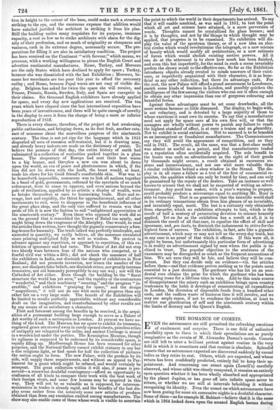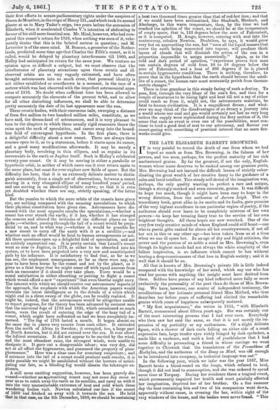THE ROMANCE OF COM - RTS.
EVEN the astronomers are still permitted the refreshing. emotions of excitement and surprise. There is one field of unlimited. possibility open to them in which their speculations are as purely imaginative as the events of M. Alexandre Dumas's novels. Comets are still left to litter a brilliant protest against routine in the very field in which it is sometimes said that routine is absolute. Splendid comets that no astronomer expected are discovered suddenly by casual ladies as they retire to rest. Others, which are expected, and whose return has been confidently predicted, entirely fail to keep their ap- pointment. And concerning one comet again (Lexell's) carefully observed, and whose orbit was closely computed, it remains an entirely open question whether it has been wholly absorbed and appropriated by the planet dapiter, or has gone off into infinite space never to return, or whether we are still at intervals beholding it without recognizing its identity. Even the comet on which astronomers have now been gazing for some six successive nights is a doubtful character. Some of them—as for example M. Babinet—believe that it is the same which in 1264 looked down upon the amazed English barons during
their first efforts to secure parliamentary rights under the auspices of Simon de Mont fort, in the reign of Henry III., and which took its second glance at us in Mary Tudor's reign, two years befoke the accession of Flizabeth, when it accelerated Charles V.'s intention of abdicating in favour of his still more fanatical son. Mr. Hind, however, who had com- puted this comet's return for 1858, when nothing was seen of it, vehe- mently denies that this is the belated meteor in question; and M. Leverrier is of the same mind. M. Bomme, a geometer of the Nether- lands, predicted some time ago that Charles the Fifth's comet, as it is called, would be delayed by planetary interferences till 1860, and Halley had anticipated its return for the same year. We venture no opinion upon so difficult a subject, but we must observe that the interferences of planetary attractions upon these erratic and ill. observed orbits are so very vaguely estimated, and have often brought astronomers into so much error, that personal identity is not either established or overthrown in a moment, in the case of a meteor which was last observed with the imperfect astronomical appa- ratus of 1556. No doubt when sufficient time has been allowed to compute accurately the elements of the present arbit, and to allow for all other disturbing influences, we shall be able to determine pretty accurately the date of its last appearance near the sun.
These erratic bodies, with their enormous tails, sweeping a distance of from five million to two hundred million miles, constitute, as we have said, the dream-land of astronomers, and it is very pleasant to turn to the chapters in which these usually rigid reasoners throw the reins upod the neck of speculation, and career away into the bound- less field of extravagant hypothesis. In the first place, there is a delightful difficulty about a new comet. There are always three courses open to it, as to n statesman, before it starts upon its career, and a good many modifications afterwards. It may be merely a its movements body, revolving in thin ellipses, and as regular in movements is the earth or Jupiter itself. Such is Halley's celebrated seventy-year comet. Or it may be moving in either a parabolic or hyperbolic orbit, in neither of which cases can it ever return again to the same place, but must for ever explore new fields of space. But the difficulty lies here, that it is an extremely delicate matter to distin- guish accurately, from a single set of observations, between a comet moving in a very elongated ellipse of many hundred years' period, and one moving in an absolutely infinite curve; so that it is even yet doubted whether there are any, strictly speaking, of the latter kind.
But the puzzles to which the mere orbits of the comets have given rise, are nothing compared with the amusing speculations to which their physical constitution have given rise. Astronomers have dis- cussed with the most opposite results the speculations,—whether a comet has ever struck the earth; if it has, whether it has changed the seasons and altered the latitudes of the different places on our globe ;—whether, passing through the tail of a comet would be preju- dicial to us, and in what way ;—whether it would be possible for a new comet to carry off the earth with it as a satellite ;—and whether such an effect would be fatal to human arrangements or not. All these questions open up a delightful field of speculation, and not an entirely unpractical one. It is pretty certain that Lexell's comet went so near to Jupiter, in 1779, as either to be absorbed into his system, or to have been projected into a very new and unanticipated path by his influence. It is satisfactory to find that, as far as we can see, the unpleasant consequences, so far as there were any, ap- pear to have been borne by the comet and not by the planet, as it gives us a faint hope that we might come off with equal success from such an encounter if it should ever take place. There would be a moral satisfaction in either absorbing or putting to flight a comet which would afford a new "experience" that even Goethe might envy. The interest with which we should receive our astronomers' reports of the approach, the emphasis with which the American papers would circulate the latest intelligence as to the details of a crisis which might end in a clean sweep of the globe, can be readily realized. It might be, indeed, that the astronomers would be altogether unable to report progress, for the theory has been advanced by eminent men that the universal fogs of 1783 and 1831, which occasioned so much alarm, were the result of entering the edge of the hazy tail of a comet, which might have suffocated us had we been completely im- mersed. "The fog of 1783 lasted a month. It began almost on the same day in Places very remote from each other. It extended from the north of Africa to Sweden; it occupied, too, a large part of North America, but it did not extend over the sea. It rose above the loftiest mountains. It did not appear to be carried by the wind, and the most abundant. rains, the strongest winds, were unable to dissipate it. It gave out a disagreeable odour; was very dry, did not at all affect the hygrometer, and possessed the property of phos- phoresenee." Here was a clear case for cometary conjecture ; and if entrance into the tail of a comet could produce such results, it is quite possible we might be annihilated without the horrors of antici- pating our fate, as a blinding fog would disarm the telescopic ex- plorers.
A still more exciting suggestion, however, has been gravely dis- cussed—whether an approaching oomet may not some day come so near us as to catch away the earth as its satellite, and carry us with it into the very uncomfortable extremes of heat and cold which these wandering bodies visit. Newton calculated our fate if the comet of 1680 had fetched as away with it towards the sun. He held that in that case, on the 8th December, 1680, we should be sustaining
a heat two thousand times greater than that of red-hot iron ; and that if we could have been acclimatized, like Shadrach, Meshed), and Abednego, to this warm temperature, then, by the time we had reached the aphelion of the comet, we should be at the temperature of empty space, that is, 122 degrees below the zero of Fahrenheit, as it is computed. M. Arago, however, entering with zeal into the controversy, rebukes Newton. Doubtless, he says, it would grow very hot on approaching the sun, but "soon all the liquid masses that cover the earth being converted into vapour, will produce thick layers of clouds that will diminish the action of the sun in a proportion impossible to assign numerically." Again, as to the cold and dark period of aphelion, "experience proves that man can sustain degrees of cold from 56 to 58 degrees below the zero of Fahrenheit, and a heat of 266 degrees if he is placed in certain hygrometric conditions. There is nothing, therefore, to prove that in the hypothesis that the earth should become the satel- lite of a comet, the human race must necessarily perish from thermo- metric changes."
There is true grandeur in this steady facing of such a destiny. To pass, first, through the very blaze of the sun's fire, and then for a couple of centuries to be losing light and heat till not a ray of either could reach us from it, might not, the astronomers maintain, be fatal to human civilization. It is a magnificent dream ; and what- ever we may think of the disadvantages of so dreary a journey into a world where our coal and gas would certainly not last us very long unless the supply were replenished during the fiery section of it, the sense that such an event is even one of the possibilities, must con- tinue to lend a good deal of zest to our astronomy, and flavour our comet-gazing with something of practical interest that no mere fire- works could give.































 Previous page
Previous page